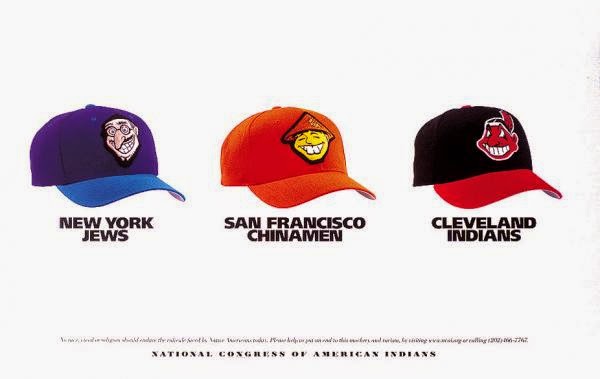Last week, I saw a story on the web about a t-shirt that had gotten suddenly popular on several reserves of the Ontario First Nations. Here’s the shirt, a parody of Major League Baseball’s Cleveland Indians lettering and logo:
The t-shirt came to prominence when a member of the group A Tribe Called Red wore it in a publicity photo–and a festival the group was scheduled to perform at was threatened with a boycott because of the racist shirt. I wonder if the person or people calling for the boycott insists that Chief Wahoo is a loving tribute?
Is the shirt offensive? Not to me. Is it racist? I honestly can’t say. It’s mildly amusing, but certainly not as effective at making a point as this effort from the National Congress of American Indians (NCAI) from 2001:
Part of the problem with the Caucasians t-shirts (which is illustrated by the NCAI hats) is that I don’t know if there’s really a ‘one size fits all’ slur that’s going to cut white people the way an N-Bomb will, or the way a war-whooping Indian image does. They’re too easy to shrug off: Cracker? I’m from New York. Redneck? Sorry, that’s a farmer (and Jeff Foxworthy and Larry the Cable Guy somehow made ‘redneck’ somewhat fashionable among rednecks, at least based on all the t-shirts sold at the county fair over the last ten years). Honky? Last time I heard that was on The Jeffersons, and I still don’t know what the hell it means. Those words really don’t seem to hurt the average white American because it’s too easy to say, “Sorry, that’s not me.”
I believe that most white people aren’t malicious. We’re just insensitive, which is born out of the fact that we haven’t had to deal with discrimination on a level that really hits home. We haven’t been subject to stop-and-frisk measures because or our skin color; found ourselves doing more time for the same crime as someone of another race; been forced from our homes and sent to live hundreds or thousands of miles away; or had a price put on our head by the government, which was certainly something I never learned when studying the colonial period in school, and may be where the term ‘redskin’ really comes from. As a result, it’s hard for us to really understand. “Toughen up,” we say. “Get over it already. It really isn’t. We’ve made great strides in so many areas in the last hundred years, and even over the course of my lifetime. There’s still a long way to go.
That’s all for now. Have a pleasant weekend.


4 Responses
Notre Dame has the Fighting Irish (I really don't like their mascot, either!). Boston has the Celtics. I guess I just see team names as being seen in the POSITIVE and in some way, respectful (or strong). People wear those symbols with pride, not to be offensive.
This is a very interesting post. I never really thought about sports team names and bigotry before. I guess it's harder to see prejudice when you're at the top of the food chain. But living outside the US I've seen a lot of prejudice against women (some by women). It makes sense to change our language as a start to fight bigotry and make it less acceptable. It's very hard though when it seems it's human nature to always be drawing a line between "us" and "them" no matter who us and them are.
Stacy, I was thinking about that, too. Notre Dame doesn't even seem to know where the nickname came from–it seems to have derived, interestingly enough, from slurs hurled at the predominantly Irish-Catholic student athletes when they traveled back in the early days. In this case, the derogatory term was adopted by the targets and turned into something positive. As for the Celtics, the team website indicates it was a blatant attempt by the team's original owner to pander to the high Irish population in Boston.
I don't think the INTENT is to harm with names like Indians, Braves, etc. However, some studies have been done that indicated that such names–and particularly logos like Chief Wahoo and the retired Chief Noc-a-home of Atlanta Braves fame–have fairly severe impacts on American Indians' self-esteem, particularly in younger people.
Lexa, I agree completely. We've never experienced it, we don't intend it, therefore it's easy not to see. And yes, women still get dumped on far too much in this world, and this country. As for the lines, we have to make sure they allow movement between groups and don't become walls. Thanks for commenting.
As usual, a thought-provoking post! Kudos, Jeff.